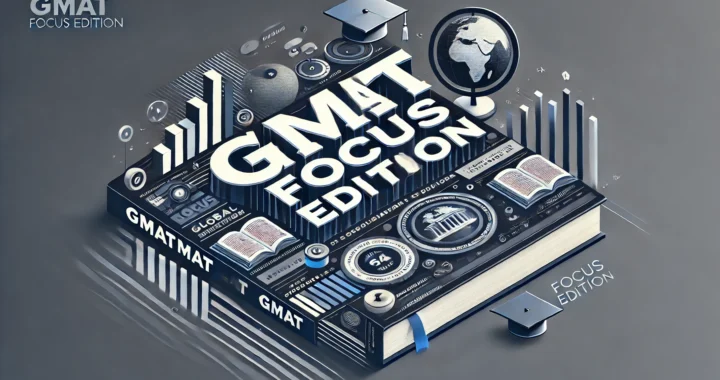The GMAT Focus Edition 2024 introduces a streamlined syllabus designed to align with the evolving needs of MBA aspirants and business schools. The new format focuses on three key sections—Quantitative Reasoning, Verbal Reasoning, and Data Insights—while removing the essay and integrated reasoning sections. This allows students to target core skills and save time during preparation. Here’s a quick breakdown:
- Quantitative Reasoning: Advanced problem-solving and data analysis skills.
- Verbal Reasoning: Enhanced focus on critical reasoning and concise comprehension.
- Data Insights: A brand-new section emphasizing interpretation and decision-making.
Keep reading to explore the complete GMAT Focus syllabus, section-wise insights, and preparation strategies to ace the exam.
What is the GMAT Focus Edition?

The GMAT Focus Edition is the latest version of the Graduate Management Admission Test, launched in 2024. This updated exam is designed to assess candidates’ readiness for graduate management education while reflecting the evolving needs of business schools and employers.
Key features of the GMAT Focus Edition include:
- Shorter test duration: The exam now takes approximately 2 hours and 15 minutes to complete, down from the previous 3 hours and 7 minutes.
- Focused content: The GMAT Focus Edition Syllabus emphasizes critical reasoning, data interpretation, and problem-solving skills.
- Adaptive testing: The exam uses advanced algorithms to adjust question difficulty based on the test-taker’s performance.
- Immediate score preview: Candidates can view their unofficial scores immediately after completing the test.
- Enhanced digital whiteboard: An improved on-screen tool for note-taking and calculations during the exam.
The GMAT Focus Edition Syllabus retains the core sections of Quantitative Reasoning, Verbal Reasoning, and Analytical Writing Assessment, but with updated content and question types to better align with current business practices and technologies. The GMAT Focus Edition also introduces new question formats and content areas that reflect the skills needed in today’s business world. For example, there’s an increased emphasis on data interpretation and analysis, mirroring the growing importance of data-driven decision-making in business.
Moreover, the GMAT Focus Edition Syllabus incorporates more real-world scenarios and practical applications of concepts, making the exam more relevant to the challenges MBA students and graduates are likely to face in their careers.
Why is the GMAT Focus Edition Important for MBA Aspirants?

The GMAT Focus Edition holds significant importance for MBA aspirants for several reasons:
- Admissions advantage: Many top business schools require or strongly prefer GMAT scores as part of their application process. The GMAT Focus Edition Syllabus is designed to showcase skills that are highly valued in MBA programs.
- Skill assessment: The exam evaluates critical thinking, analytical writing, and problem-solving abilities – essential skills for success in graduate business programs and future careers.
- Global recognition: The GMAT is accepted by over 7,000 programs at approximately 2,300 schools worldwide, making it a versatile credential for international applications.
- Career preparation: The GMAT Focus Edition Syllabus aligns closely with the skills demanded by employers in the current business landscape, giving test-takers a preview of the challenges they may face in their future careers.
- Scholarship opportunities: Many business schools use GMAT scores as a factor in awarding merit-based scholarships, making a strong performance on the exam potentially financially beneficial.
- Competitive edge: With the updated format and content, excelling in the GMAT Focus Edition can help applicants stand out in a competitive admissions landscape.
The importance of the GMAT Focus Edition extends beyond just admissions. According to a survey conducted by the Graduate Management Admission Council (GMAC) in 2023, 9 out of 10 corporate recruiters stated that they value the skills assessed by the GMAT, including critical thinking, problem-solving, and data analysis. This underscores the exam’s relevance to real-world business scenarios.
Furthermore, a study by Kaplan Test Prep found that 96% of business schools consider applicants’ GMAT scores to be an important part of the admissions process. The GMAT Focus Edition Syllabus, with its updated content and format, ensures that these scores remain a reliable indicator of a candidate’s potential for success in an MBA program.
GMAT Focus Edition Syllabus Overview

The GMAT Focus Edition Syllabus comprises three main sections, each designed to assess different aspects of a candidate’s abilities. Here’s an overview of the syllabus structure:
| Section | Description | Time Allotted | Number of Questions |
|---|---|---|---|
| Quantitative Reasoning | Tests problem-solving and data sufficiency skills | 45 minutes | 21 questions |
| Verbal Reasoning | Evaluates reading comprehension, critical reasoning, and sentence correction abilities | 45 minutes | 23 questions |
| Analytical Writing Assessment (AWA) | Assesses analytical writing and communication skills | 30 minutes | 1 essay |
The GMAT Focus Edition Syllabus emphasizes real-world applications and scenario-based questions across all sections. The exam also includes an optional 8-minute break between the Quantitative and Verbal sections.
It’s important to note that while the overall structure remains similar to previous versions, the GMAT Focus Edition Syllabus introduces several key changes:
- Increased emphasis on data interpretation: Approximately 25% of questions now involve analyzing graphs, charts, or tables.
- New question types: The exam introduces innovative formats that test integrated reasoning skills.
- Reduced redundancy: The syllabus eliminates overlap between sections, ensuring a more efficient assessment.
- Updated content: Questions reflect current business trends and technologies, including digital transformation and sustainability.
According to GMAC, these changes were implemented based on feedback from business schools and employers, ensuring that the GMAT Focus Edition Syllabus remains a relevant and valuable assessment tool for MBA admissions.
Section-Wise Breakdown of the GMAT Focus Edition Syllabus

Let’s delve deeper into each section of the GMAT Focus Edition Syllabus:
Quantitative Reasoning Syllabus
The Quantitative Reasoning section of the GMAT Focus Edition Syllabus tests mathematical and logical reasoning skills. Key topics include:
- Arithmetic: Includes operations, percentages, ratios, and basic number properties.
- Algebra: Covers equations, inequalities, functions, and exponents.
- Geometry: Focuses on lines, angles, triangles, quadrilaterals, and circles.
- Word problems: Tests ability to translate real-world scenarios into mathematical models.
- Data interpretation: Involves analyzing graphs, charts, and tables.
Question types:
- Problem Solving: Multiple-choice questions testing mathematical concepts.
- Data Sufficiency: Unique GMAT question type assessing ability to determine if given information is sufficient to solve a problem.
Verbal Reasoning Syllabus
The Verbal Reasoning section assesses language proficiency and analytical skills. Main areas of focus include:
- Reading Comprehension: Tests ability to understand, analyze, and draw inferences from written passages.
- Critical Reasoning: Evaluates skills in constructing and evaluating arguments.
- Sentence Correction: Assesses grammar, style, and logical predication in written English.
Question types:
- Multiple choice
- Passage-based questions
Analytical Writing Assessment (AWA) Syllabus
The AWA section requires candidates to analyze an argument and write a critique. Key aspects evaluated include:
- Critical thinking: Ability to identify and evaluate the logical structure of arguments.
- Communication: Clarity and effectiveness in expressing ideas.
- Analytical writing: Skills in organizing thoughts and presenting a cohesive, well-reasoned analysis.
Task:
- Analyze an argument and provide a written response
| Section | Key Topics | Skills Tested |
|---|---|---|
| Quantitative Reasoning | Arithmetic, Algebra, Geometry, Data Interpretation | Problem-solving, Mathematical reasoning, Data analysis |
| Verbal Reasoning | Reading Comprehension, Critical Reasoning, Sentence Correction | Language proficiency, Analytical thinking, Logical reasoning |
| AWA | Argument Analysis | Critical thinking, Analytical writing, Communication |
GMAT Focus Edition Exam Pattern

The GMAT Focus Edition follows a specific exam pattern designed to assess various skills efficiently. Here’s a detailed breakdown of the exam structure:
| Section | Time | Questions | Question Types | Scoring Range |
|---|---|---|---|---|
| Quantitative Reasoning | 45 minutes | 21 | Problem Solving, Data Sufficiency | 6-51 |
| Verbal Reasoning | 45 minutes | 23 | Reading Comprehension, Critical Reasoning, Sentence Correction | 6-51 |
| Analytical Writing Assessment | 30 minutes | 1 essay | Argument Analysis | 0-6 |
| Total Exam Time | 2 hours 15 minutes (including optional 8-minute break) | – | – | 200-800 |
Key features of the GMAT Focus Edition exam pattern:
- Computer-adaptive testing for Quantitative and Verbal sections: The difficulty of questions adapts based on the test-taker’s performance.
- No negative marking: Incorrect answers do not result in point deductions.
- Immediate unofficial score preview for Quantitative and Verbal sections: Candidates can view their scores right after completing the exam.
- AWA scores typically available within 10 days: Essay responses are evaluated by both human raters and automated scoring systems.
The GMAT Focus Edition also introduces a new scoring algorithm that provides a more accurate assessment of a candidate’s abilities. This algorithm takes into account not only the number of correct answers but also the difficulty level of the questions answered correctly. Additionally, the exam now includes an enhanced score report that provides more detailed insights into a test-taker’s performance across different skill areas. This report can be valuable for both candidates and admissions committees in understanding strengths and areas for improvement.
How to Prepare for the GMAT Focus Edition

Effective preparation is crucial for success in the GMAT Focus Edition. Here are some strategies and resources to help you prepare:
Effective Study Strategies
- Create a study schedule: Allocate 2-3 months for preparation, studying 2-3 hours daily. Consistency is key to building and retaining knowledge.
- Take practice tests: Aim for at least 5-7 full-length practice exams under timed conditions. This helps build stamina and familiarity with the exam format.
- Focus on weak areas: Identify and prioritize topics that need improvement. Use error logs to track your mistakes and learn from them.
- Use official GMAT materials: These most accurately reflect the actual exam content and format. The Official Guide for GMAT Review is considered the gold standard in preparation materials.
- Develop time management skills: Practice pacing yourself to complete each section within the allotted time. Time management is crucial for success in the GMAT Focus Edition.
- Utilize adaptive learning technologies: Many online GMAT prep courses now offer personalized study plans based on your performance, helping you focus on areas that need the most improvement.
- Join study groups or forums: Collaborating with other GMAT aspirants can provide motivation, new perspectives, and opportunities to explain concepts (which reinforces your own understanding).
Recommended Study Materials for GMAT Focus Edition
- Official GMAT Focus Edition Guide: The most authoritative source for exam content and format.
- GMAT Official Practice Questions: A bank of authentic GMAT questions for targeted practice.
- GMAT Official Practice Exams: Full-length, computer-adaptive tests that closely mimic the actual exam experience.
- Manhattan Prep GMAT Strategy Guides: A comprehensive set of books covering all GMAT topics in depth.
- Kaplan GMAT Prep Plus: Offers both content review and strategic advice for tackling the exam.
- Magoosh GMAT Prep: An online platform with video lessons, practice questions, and study schedules.
- Veritas Prep GMAT Course: Known for its rigorous curriculum and high-quality instructors.
Common Mistakes to Avoid During GMAT Preparation
- Neglecting the AWA section: While it doesn’t contribute to the 200-800 score, the AWA is still important for many business schools.
- Over-relying on memorization instead of understanding concepts: The GMAT Focus Edition tests application of knowledge, not just recall.
- Ignoring time management during practice sessions: Always practice under timed conditions to build the pacing skills needed for the actual exam.
- Focusing solely on content without developing test-taking strategies: Understanding the unique question formats and tricks of the GMAT is crucial.
- Not practicing with the online whiteboard tool: Familiarize yourself with this tool as it’s the only note-taking method allowed during the exam.
- Studying inconsistently: Sporadic, intense study sessions are less effective than regular, moderate-length sessions.
- Neglecting to review and learn from mistakes: Always analyze your errors to prevent repeating them.
| Preparation Aspect | Recommended Approach |
|---|---|
| Study Duration | 2-3 months |
| Daily Study Time | 2-3 hours |
| Practice Tests | 5-7 full-length exams |
| Key Resources | Official GMAT materials, reputable third-party guides |
| Focus Areas | Content knowledge, time management, test-taking strategies |
Free GMAT Focus Edition Syllabus PDF Download
To support your preparation for the GMAT Focus Edition, we offer a comprehensive PDF guide covering the entire syllabus. This free resource includes:
- Detailed breakdown of each section
- Sample questions with explanations
- Study tips and strategies
- Recommended practice schedule
- Overview of recent changes in the GMAT Focus Edition Syllabus
- List of additional resources for further study
To download your free GMAT Focus Edition Syllabus PDF, [https://www.kaptest.com/gmat/free/gmat-practice]
FAQs About the GMAT Focus Edition
- Q: How does the GMAT Focus Edition differ from previous versions?
A: The GMAT Focus Edition is shorter, more focused on critical thinking and data analysis, and offers immediate score previews for Quantitative and Verbal sections. It also includes updated question types and content areas. - Q: Is the GMAT Focus Edition accepted by all business schools?
A: Most schools now accept the GMAT Focus Edition, but it’s best to check with your target schools for their specific requirements. As of 2024, over 7,000 programs worldwide accept GMAT scores. - Q: Can I use old GMAT preparation materials for the Focus Edition?
A: While some content may still be relevant, it’s recommended to use updated materials specifically designed for the GMAT Focus Edition Syllabus. The new format and emphasis on certain skills make newer materials more beneficial. - Q: How long are GMAT Focus Edition scores valid?
A: GMAT Focus Edition scores are typically valid for five years from the test date. However, some schools may have different policies, so it’s advisable to check with individual institutions. - Q: Can I retake the GMAT Focus Edition if I’m not satisfied with my score?
A: Yes, you can retake the exam after a 16-day waiting period, with a maximum of five attempts per year and eight total lifetime attempts. - Q: How does the scoring work for the GMAT Focus Edition?
A: The GMAT Focus Edition provides scores for each section (Quantitative, Verbal, and AWA) as well as a total score ranging from 200 to 800. The Quantitative and Verbal sections are scored on a scale of 6 to 51, while the AWA is scored from 0 to 6. - Q: Are there any new question types in the GMAT Focus Edition?
A: While the basic question types remain similar, the GMAT Focus Edition includes more integrated reasoning questions and data interpretation tasks across all sections. - Q: How does the adaptive testing in the GMAT Focus Edition work?
A: The difficulty of questions in the Quantitative and Verbal sections adjusts based on your performance. If you answer questions correctly, you’ll receive more challenging questions, and vice versa. This allows for a more accurate assessment of your abilities.
Conclusion
The GMAT Focus Edition Syllabus represents a significant evolution in graduate management admission testing. By understanding the exam’s structure, content, and best preparation strategies, you can approach the GMAT with confidence. Remember that success on the GMAT Focus Edition requires a combination of content knowledge, critical thinking skills, and effective test-taking strategies. Utilize the resources provided, including the free GMAT Focus Edition Syllabus PDF, to guide your preparation. With dedicated study and practice, you can master the GMAT Focus Edition and take a crucial step towards your MBA aspirations.




